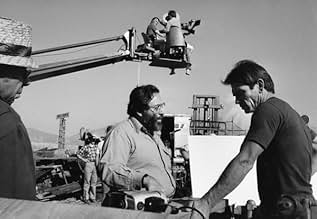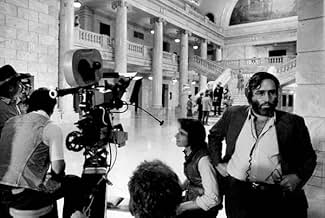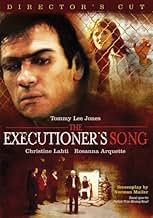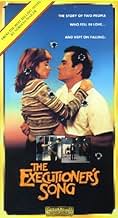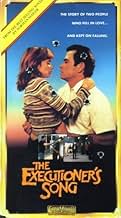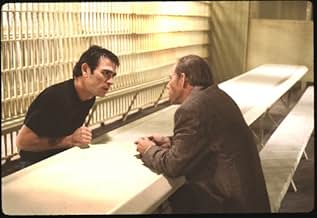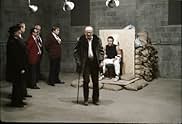IMDb RATING
7.0/10
2.2K
YOUR RATING
The story of Gary Gilmore, a convicted murderer who lobbied for his own execution.The story of Gary Gilmore, a convicted murderer who lobbied for his own execution.The story of Gary Gilmore, a convicted murderer who lobbied for his own execution.
- Won 2 Primetime Emmys
- 2 wins & 3 nominations total
Norris Mailer
- Lu-Ann
- (as Norris Church)
Featured reviews
"The Executioner's Song" from 1982 was a TV movie, and on Netflix, I believe they send out the director's cut. It has lots of Roseanna Arquette's breasts and other body parts.
Based on the book by Norman Mailer (who also wrote the screenplay), this is the story of Gary Gilmore, who became famous by demanding that the state of Utah go ahead with his execution. It was the first execution in the US since the 1960s and the first since 1972 when the Supreme Court ruled that death sentences prior to that date were unconstitutional, which is why the Manson group was not executed.
Gilmore, who requested to face a firing squad, became kind of a cause celebre. As a hero of some sort, I suppose he fits in well with today's idea of a celebrity. He was basically a loser who always chose the easy way out. When he was released on parole for robbery, he had the help and support of his cousin (Christine Lahti) and his uncle (Eli Wallach), but he was unable to hold down a job and became obsessed with a 19-year-old (Arquette) with two children.
He then returned to the robbery business and for no good reason shot and killed two people after he robbed them.
I believe this was a TV movie in two parts, so what I saw was shortened. As a result, to make way for Arquette's body, there was quite a bit cut, making it jerky.
My main problem was getting any sympathy going for Gilmore or Arquette. Tommy Lee Jones did a terrific job, but even though Gary's family loved him and just hated the things he did, I as an audience member didn't share their feelings. As far as I'm concerned, he wanted to die because he didn't want to stay in prison. He robbed so he could pay for a truck and didn't have to work. Same old story - the easy way out.
This story was described as "tragic." The tragedy is that the Arquette character had two children. She was a whack job who tried to commit suicide so that she and Gary could continue their affair in heaven. It said at the end of the movie that she moved and started over. I hope for the sake of her kids that she made it. I have no doubt with her figure she met somebody. Let's hope it wasn't another loser.
Based on the book by Norman Mailer (who also wrote the screenplay), this is the story of Gary Gilmore, who became famous by demanding that the state of Utah go ahead with his execution. It was the first execution in the US since the 1960s and the first since 1972 when the Supreme Court ruled that death sentences prior to that date were unconstitutional, which is why the Manson group was not executed.
Gilmore, who requested to face a firing squad, became kind of a cause celebre. As a hero of some sort, I suppose he fits in well with today's idea of a celebrity. He was basically a loser who always chose the easy way out. When he was released on parole for robbery, he had the help and support of his cousin (Christine Lahti) and his uncle (Eli Wallach), but he was unable to hold down a job and became obsessed with a 19-year-old (Arquette) with two children.
He then returned to the robbery business and for no good reason shot and killed two people after he robbed them.
I believe this was a TV movie in two parts, so what I saw was shortened. As a result, to make way for Arquette's body, there was quite a bit cut, making it jerky.
My main problem was getting any sympathy going for Gilmore or Arquette. Tommy Lee Jones did a terrific job, but even though Gary's family loved him and just hated the things he did, I as an audience member didn't share their feelings. As far as I'm concerned, he wanted to die because he didn't want to stay in prison. He robbed so he could pay for a truck and didn't have to work. Same old story - the easy way out.
This story was described as "tragic." The tragedy is that the Arquette character had two children. She was a whack job who tried to commit suicide so that she and Gary could continue their affair in heaven. It said at the end of the movie that she moved and started over. I hope for the sake of her kids that she made it. I have no doubt with her figure she met somebody. Let's hope it wasn't another loser.
Norman Mailer's book about Gary Gilmore was compelling in the first half, but the second half was a limp, uphill struggle. There's no such problem in the TV adaptation, which is tighter and absorbing all the way through, with both Tommy Lee Jones and Rosanna Arquette giving two of the best performances of their careers... you now know why it's easy for us to forgive him for "Batman Forever" and her for "Off The Wall" (which she made the following year, and oh dear me that was BAD).
This is available in both miniseries form and a shortened cable/theatrical version (to quote Buffy Summers, "We're talking violence, strong language, adult themes..."), but I actually prefer the TV version because while you get more nudity - female AND male - and more graphic scenes in the cable cut (not to mention lines like Rosanna's "Yeah, you and seven other motherf***ers"), it's at the expense of a little story coherence; you lose some seaminess in the miniseries version, but the tale is ultimately stronger, clearer and not so rushed. But either version is a must.
This is available in both miniseries form and a shortened cable/theatrical version (to quote Buffy Summers, "We're talking violence, strong language, adult themes..."), but I actually prefer the TV version because while you get more nudity - female AND male - and more graphic scenes in the cable cut (not to mention lines like Rosanna's "Yeah, you and seven other motherf***ers"), it's at the expense of a little story coherence; you lose some seaminess in the miniseries version, but the tale is ultimately stronger, clearer and not so rushed. But either version is a must.
There seems to be a little confusion regarding the various versions of The Executioner's Song. I read the book written by Norman Mailer in 1980 and looked forward to seeing the film. The original film version was a made for TV mini series which aired in 1982. That version was much longer and also had numerous period songs included. Those songs were listed in the credits at the end. The TV mini-series version did not contain any profanity or full nudity. Some scenes were darkened and some were eliminated while extra scenes with additional dialogue were included. The second version was aired on cable television. It was the same version that was released in Europe in 1985. It was also released on "USA Home Video" on VHS tape. That version was much shorter; however it contained profanity, more violence and several nude scenes of Rosanna Arquette and Tommy Lee Jones. Those scenes seemed a little bit dark however. Also, several period songs were removed from the film even though they are still listed in the credits. The newest version of the film which I watched on Net Flix recently is also referred to as "The Director's Cut". I own the original 1985 "Big Box" VHS tape of the European version and compared those two versions scene by scene. The newest version includes all of the profanity, violence and all of the nude scenes from the European version. The content is exactly the same. The main difference in the two versions is that the newer DVD is much brighter, has more clarity and the colors are superior by far. The nude scenes are not darkened at all. The sound is a bit louder on the old VHS version though. The period songs that were taken out of the film are no longer listed in the end credits with the exception of one Neil Young song only. Waylon Jennings is given credit for all of the original songs he wrote for the film. I do not own the original TV mini-series version from 1982 and have to rely upon my memory to compare it to the newer versions. With that said, I prefer the new high quality version to the older, longer made for TV mini-series and also to the inferior quality European VHS release. Basically what you get with the newest release is a much higher quality European version. Did I mention that a much younger Rosanna Arquette is nude in several scenes?
I thought this was a very good dramatization of Mailer's huge book. Tommy Lee Jones does an excellent job of portraying psychopathic killer Gary Gilmore and Rosanna Arquette is terrific as his teenage girlfriend, Nicole. While it was a made for TV movie, some R-rated footage was added in when the movie had a European release. If you can get that version on tape, do so. Rosanna is dynamite in the more adult scenes.
Christine Lahti (who later won a short-film Oscar as a filmmaker) and Eli Wallach provide solid support. Jones shows the same brooding intensity that years later translated into an Oscar for him in "The Fugitive." Look for Ron Howard's father, Rance Howard, in a small part as the police detective who first interrogates Gilmore after his arrest.
It says something about the culture when a loser like Gilmore can be transformed into a sort of folk legend which is what the book and movie ultimately do. He had an enormous impact in 1977 by demanding that Utah go forward with his execution, the first execution in the US since the 1960s and the first since 1972 when the Supreme Court ruled that all death sentences prior to that date were unconstitutional. After Gilmore faced the firing squad hundreds of executions have been carried out. I would wager though that most Americans couldn't name more than two or three of those who have been executed but they will remember the small-time loser Gary Gilmore.
Christine Lahti (who later won a short-film Oscar as a filmmaker) and Eli Wallach provide solid support. Jones shows the same brooding intensity that years later translated into an Oscar for him in "The Fugitive." Look for Ron Howard's father, Rance Howard, in a small part as the police detective who first interrogates Gilmore after his arrest.
It says something about the culture when a loser like Gilmore can be transformed into a sort of folk legend which is what the book and movie ultimately do. He had an enormous impact in 1977 by demanding that Utah go forward with his execution, the first execution in the US since the 1960s and the first since 1972 when the Supreme Court ruled that all death sentences prior to that date were unconstitutional. After Gilmore faced the firing squad hundreds of executions have been carried out. I would wager though that most Americans couldn't name more than two or three of those who have been executed but they will remember the small-time loser Gary Gilmore.
you may also be interested in the Mikhal Gilmore biography about his brother, Gary, and how they grew up in Oregon, being brutally abused by their father. Apparently, Gary Gilmore spent more time in juvenile detention homes than could be counted, and these institutions promoted the violent and hostile behavior which came to be seen by Gilmore as normal, even acceptable.
This film is primarily a documentary; look for Eli Wallach as Gilmore's Uncle Vern, trying to help his nephew function in the world. In Salt Lake City, Utah, where most of the film takes place, there is a cold unforgiving environment, similar to the environment Gilmore grew up in. As he grew up during the depression, options were scarce. Hostility, anger and frustration led to physical abuse, acting out, and eventually, murder. Rosanna Arquette is believable as the long-suffering girlfriend of Gilmore, who refuses to face reality.
This is an excellent film, due for a remake; perhaps Mikhal Gilmore could translate his book version into film. In real life, Gilmore's mother was devastated and traumatized, living in a trailer, mourning the horrible life her son had endured, a child who had no options, who grew up as an armed robber, and who finally demanded the state of Utah execute him in Draconian fashion. 9/10.
This film is primarily a documentary; look for Eli Wallach as Gilmore's Uncle Vern, trying to help his nephew function in the world. In Salt Lake City, Utah, where most of the film takes place, there is a cold unforgiving environment, similar to the environment Gilmore grew up in. As he grew up during the depression, options were scarce. Hostility, anger and frustration led to physical abuse, acting out, and eventually, murder. Rosanna Arquette is believable as the long-suffering girlfriend of Gilmore, who refuses to face reality.
This is an excellent film, due for a remake; perhaps Mikhal Gilmore could translate his book version into film. In real life, Gilmore's mother was devastated and traumatized, living in a trailer, mourning the horrible life her son had endured, a child who had no options, who grew up as an armed robber, and who finally demanded the state of Utah execute him in Draconian fashion. 9/10.
Did you know
- TriviaAccording to Lawrence Schiller, Debra Winger was strongly favored for Nicole Baker, but was turned down after being considered "too urban" for the role. Tatum O'Neal also read for the role.
- GoofsWhen they are releasing the straps from Gilmore after he is dead you can see his hand move. In addition the arm is closer to the leg than depicted in the previous shot.
- Quotes
Gary Mark Gilmore: Go down on me, partner... I need it
Nicole Baker: Don't call me partner.
Gary Mark Gilmore: No, darlin'... I love it... I love it
Nicole Baker: Yeah, you and seven other motherfuckers.
- Alternate versionsA 97-minutes version was released theatrically in Europe, featuring additional footage with some nudity not shown in original television version.
- ConnectionsFeatured in The 35th Annual Primetime Emmy Awards (1983)
- SoundtracksTalk Good Boogie
Written and Performed by Waylon Jennings
Produced by Chips Moman
Music Coordinator: Marylou Hyatt
Details
- Release date
- Country of origin
- Language
- Also known as
- The Executioner's Song
- Filming locations
- Production company
- See more company credits at IMDbPro
Contribute to this page
Suggest an edit or add missing content



